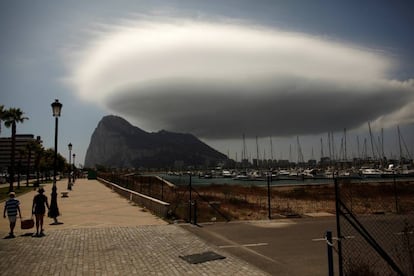EU Parliament pushes out British negotiator over Gibraltar “colony” dispute
Claude Moraes has been stripped of his position as rapporteur after refusing to recognize the definition of the British Overseas Territory in a draft law on travel visas


The European Union will define Gibraltar, a British Overseas Territory in the south of Spain, as “a colony of the British Crown” in draft legislation regarding travel to the EU without visas in a hard Brexit scenario.
I was not prepared to see Spain hold this file hostage in the European Council
British MEP Claude Moraes
The move comes after the European Parliament on Monday stripped British negotiator Claude Moraes from his role as rapporteur after he refused to accept the contentious definition of Gibraltar, requested by the Spanish government.
By removing Moraes, the draft law – which will allow visa-free travel for EU and British nationals in the case that the United Kingdom crashes out of the EU without a deal – can be approved with the definition of Gibraltar as a “colony.” This represents a win for Spain on an issue that Brussels has traditionally tried to remain neutral on.
In February, Spanish government representatives had requested to include a footnote in the draft law indicating: “There is controversy between Spain and the UK concerning the sovereignty over Gibraltar, a territory for which a solution has to be reached in light of the relevant resolutions and decisions of the General Assembly of the United Nations.”
The British government criticized the move, claiming “Gibraltar is not a colony and it is completely inappropriate to describe it in this way,” in a statement to EL PAÍS.
The dispute over the “colony” definition had threatened to derail the EU travel agreement. While it was approved by the 27 EU members, the draft legislation was held up in the European Parliament because of Moraes’s objections.

The British member of the European Parliament (MEP) refused to accept the definition of Gibraltar as a “colony of the British crown” and there was little progress on the issue after five meetings.
The growing risk that millions of Britons and EU citizens would need a visa for short stays in the case of a no-deal Brexit, pushed the president of the European Parliament, Antonio Tajani, to ask Moraes for his resignation.
When Moraes refused, the center-right European People’s Party and the Socialists and Democrats forced him to leave his position at a hearing on Monday. Sergei Stanishev, a Bulgarian politician who is the president of the Party of European Socialists, will replace Moraes as the rapporteur for the EU on the visa-free travel legislation.
The British MEP was removed from the key position on the grounds of conflict of interest. “A Briton cannot negotiate with Great Britain on an issue relating to Brexit: that would place UK representatives on both sides of the negotiations,” argued Esteban González Pons, an MEP from the Spanish Popular Party (PP).
Gibraltar is not a colony and it is completely inappropriate to describe it in this way
British government
Moraes has defended his independence and accused the Spanish government of lobbying to maintain the Gibraltar definition even though it was unnecessary to the draft law.
“I was not prepared to see Spain hold this file hostage in the European Council, with an addition that described Gibraltar legally as a ‘colony’,” he said in a press release.
British MEP Daniel Dalton came out in support of Moraes, writing in a message on Twitter that he was “shocked” that Moraes “has been forced out for rightly opposing Spanish attempts to describe Gibraltar as a colony in the text. Gibraltar is British.”
The chief minister of Gibraltar, Fabián Picardo, also expressed his support. In a press statement, he said: “The people of Gibraltar will not forget the excellent work that Claude Moraes has done. Neither will we forget those who have conspired to put their nationalistic footnotes over the rights of people.”
English version by Melissa Kitson.
Tu suscripción se está usando en otro dispositivo
¿Quieres añadir otro usuario a tu suscripción?
Si continúas leyendo en este dispositivo, no se podrá leer en el otro.
FlechaTu suscripción se está usando en otro dispositivo y solo puedes acceder a EL PAÍS desde un dispositivo a la vez.
Si quieres compartir tu cuenta, cambia tu suscripción a la modalidad Premium, así podrás añadir otro usuario. Cada uno accederá con su propia cuenta de email, lo que os permitirá personalizar vuestra experiencia en EL PAÍS.
¿Tienes una suscripción de empresa? Accede aquí para contratar más cuentas.
En el caso de no saber quién está usando tu cuenta, te recomendamos cambiar tu contraseña aquí.
Si decides continuar compartiendo tu cuenta, este mensaje se mostrará en tu dispositivo y en el de la otra persona que está usando tu cuenta de forma indefinida, afectando a tu experiencia de lectura. Puedes consultar aquí los términos y condiciones de la suscripción digital.








































